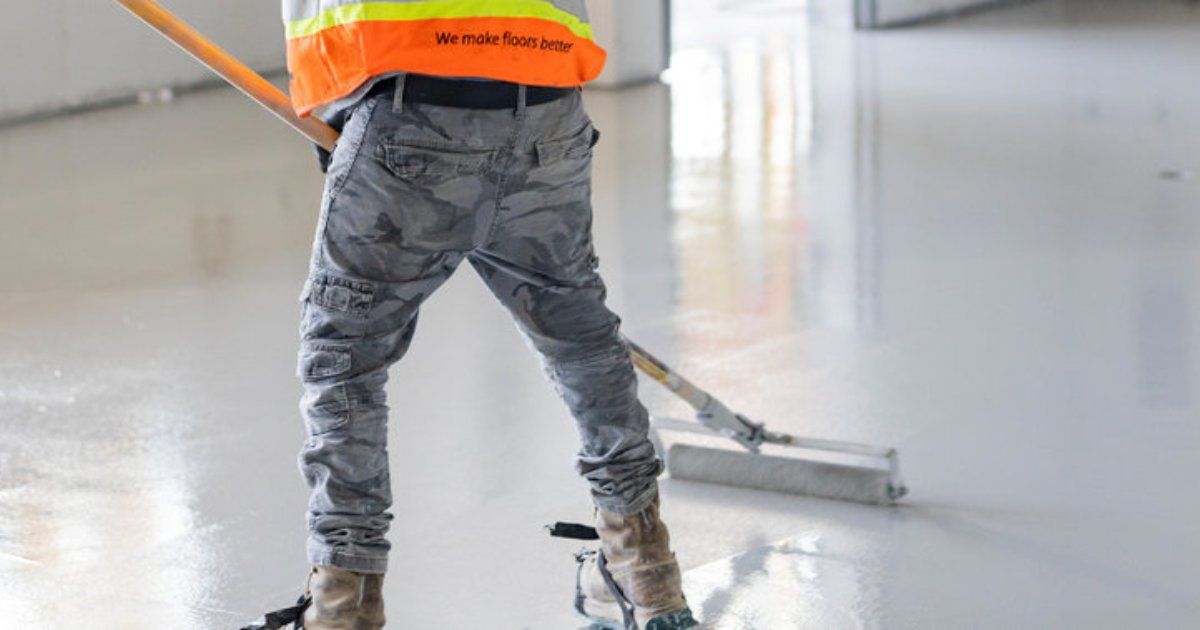
The science of epoxy—while it seems like simple enough chemistry, there’s more to it when it comes to building durable floors. Today, we’re breaking down precisely how epoxy flooring works and what ensures the best flooring for your future renovation project.
Before we break down the science of epoxy, it would be good to start off with understanding what it is and how it’s used in flooring applications. Luckily for you, BNE Concrete Floors & Coatings are some of the frontrunning experts in the industry and know the ins and outs of all things epoxy and flooring.
So, What Is Epoxy?
Epoxy is a type of polymer comprised of two components, typically called resin and hardener, mixed into specific proportions. When these components are combined, a chemical reaction happens and creates a hardened material with a myriad of useful applications. The science of epoxy can be broken down through the two primary chemical compounds that make up epoxy, which we’ll break down now:
The Two Primary Components of Epoxy
To understand epoxy on a scientific level, it’s important to understand the two primary components that make up the chemical composition of epoxy. Let’s explore further:
Resin: Resin is the basic component of epoxy. It's typically a clear/light-coloured liquid that contains the necessary reactive sites for cross-linking with the hardener. Resins typically vary in their viscosity and flexibility, depending on the application you intend to use it for.
Hardener: Also referred to as the curing agent, the hardener is usually a darker-coloured liquid. When mixed with resin, this compound triggers a chemical reaction that causes the epoxy to harden. The choice of hardener can impact the final epoxy's overall curing time, strength, and other properties.
When these compounds are mixed, they undergo a process called curing. During this process, the molecules of the resin and hardener react in tandem to form strong chemical bonds, creating a rigid, durable material. This process is impacted by several factors, including temperature, humidity, and the formulation of epoxy.
Epoxy has several applications and is suitable for several industries, such as:
Adhesives: Epoxy adhesives are typically used as bonding materials such as metals, composites, plastics, and wood. They are very durable and make for great adhesion properties.
Surface coating: Epoxy resin can be applied as a surface coating in industrial applications due to its resistance to corrosive materials and durability.
As sealant: Simply put, epoxy can be used in sealants and joint fillers to create long-lasting protection against wear and tear.
And much more.
How Epoxy is Utilized in Flooring
Once the concrete has been levelled, smoothed, and primed, resin and hardening chemicals are mixed. This mixture is then poured over the concrete and hardened before a second and third layer is applied.
During curing, these layers create a strong bond that develops a protective barrier. This can be used across several industries ranging from medical, food, education, general manufacturing and many more.
Breaking Down the Process
Typically, epoxy is used in concrete flooring to enhance its overall durability, look, and long-term performance. This can be especially useful if the flooring you’re looking to coat could be at risk for cracking or damage associated with heavy foot or vehicle traffic.
The process begins with thorough preparation, typically selecting the appropriate concrete surface profile (or CSP) and ensuring the proper terminations. Depending on your project, keying the termination could be necessary, so bear that in mind.
It's also important to note the thickness of the epoxy coating, as it directly impacts its overall durability. Thinner coatings, for example, are generally less durable, while thicker coatings are better suited for harsh environments.
Choosing the right type of epoxy, whether it is general purpose or novolac epoxy, is essential for achieving the best results.
Understanding the intended purpose of the floor, the types of chemicals it could be exposed to, and the frequency of exposure are essential for designing a successful epoxy flooring system.
Understanding Epoxy’s Makeup and Versatility
Epoxy is a very versatile material with multiple applications—it can be used to fill gaps, repair cracks, protect surfaces, and even bond materials together. Its durability makes it suitable for use across several industries, including residential, commercial, and industrial settings.
As we previously discussed, epoxy is a polymer composed of resin and hardener. When combined, these two substances create strong bonds with the chemical units of the hardener, resulting in a very durable material. Resin also contains hydroxyl groups that can bond with several other materials, further enhancing its potential adhesion.
When applied to concrete, epoxy resins are used as coatings, to repair materials, grouts, paints, adhesives, sealers, wearing surfaces, and to make polymer-modified concrete. Epoxy coatings are used to protect surfaces from corrosion and overall damage.
How Epoxy is Used on Concrete floors
Epoxy is traditionally used to coat concrete floors in commercial and industrial settings. Epoxy coatings are applied over concrete floors to offer a smooth, high-performing, durable surface that lasts for years. It can withstand heavy traffic and loads. Many industrial sites ranging from commercial buildings and warehouses utilize epoxy floors to help keep the environment not only safe for their workers but also maintain cleanliness.

Preparation and Application
An epoxy coating requires a clean and porous surface to adhere properly; otherwise, it's possible that the epoxy may not bond to sealed or polished concrete. The concrete must be cured. Before applying the epoxy floor coating, it's essential that you patch and repair any major cracks and chips in the concrete and remove any potential grease and moisture.
If the concrete is worn, it's best to do a patch test to check for previous layers of epoxy or other products that could have been applied over the years. To test for sealant, pour a tiny bit of water on the floor and watch to see if it soaks in (it should if no sealant is present). However, if it beads on the surface instead of soaking in, the surface likely has preexisting sealant on it.
Before you move forward with having the coating applied, it's important to test that the temperature is right and that the manufacturer's recommendations are being followed. Bad temperatures can cause the epoxy to bubble and peel off. It's also important to keep in mind that once the epoxy has been mixed, you have a short period of time before it starts to harden.
Depending on the type of epoxy you're working with, you may need a primer and a finishing coat. Primer is typically applied similarly to paint and is given hours to settle before applying the epoxy. It usually takes two coats of primer. The finisher is applied in the same manner but does not require water.
The Benefits of Epoxy Floor Coating
There are many perks that come with epoxy floors when compared to traditional coatings applied over concrete:
It creates a shiny, glossy surface that can improve the brightness of interior areas.
It creates a hard-wearing durable surface able to withstand heavy traffic.
It's both durable and easy to clean.
It works great for industrial and warehouse applications.
It is resistant to stains and water damage.
Can create a chemically resistant surface ideal for those working in the manufacturing industry.
It improves safety measures and can contain anti-slip additives, making it safer.
Epoxy can be applied in different patterns to create drive aisles and pedestrian walkways.
It can prevent wear and tear on concrete floors, increasing their longevity.
It can be compatible with self-levelling products and applied even on older concrete - depending on the product you're using.
It often requires little maintenance.
Practical Applications of Epoxy Coatings on Concrete
There are many ways to apply epoxy to concrete floors, some of which you may not have expected. Just as the science of epoxy is robust, so are its many applications:

Commercial Garage Floors
Epoxy coatings are great and popular choices for commercial garage floors because they can withstand heavy foot traffic, vehicle traffic, and oil and chemical spills. They provide a durable and easy-to-clean surface that can resist several stains, such as automotive fluids.
Industrial flooring
In industrial settings ranging from manufacturing facilities to factories, epoxy coatings can be used to protect concrete floors from potential wear and tear caused by heavy machinery, foot traffic, and chemical exposure. Epoxy coatings can also improve employee safety by providing a slip-resistant surface as well as traffic markation.
Commercial Spaces
Epoxy coatings are often used in commercial spaces like retail stores, restaurant settings, and offices to create an attractive and durable flooring solution. They can be customized to match the business owner's tastes, including colours, patterns, and textures.
Outdoor Spaces (Traffic & Pedestrian Epoxy Coatings)
Probably not the most common application you’d think of when using epoxy, but it can be utilized to outdoor concrete surfaces like patios, pool decks, and walkways to enhance their longevity and weather resistance. It’s also to have them customized to be UV-resistant to prevent colour fading and yellowing due to sun exposure.
Hopefully, this will help you understand the science and application of epoxy on concrete floors. If you’re looking to begin a new project for your business, consider contacting us at BNE Concrete Floors & Coatings to see how our experts can help you.
